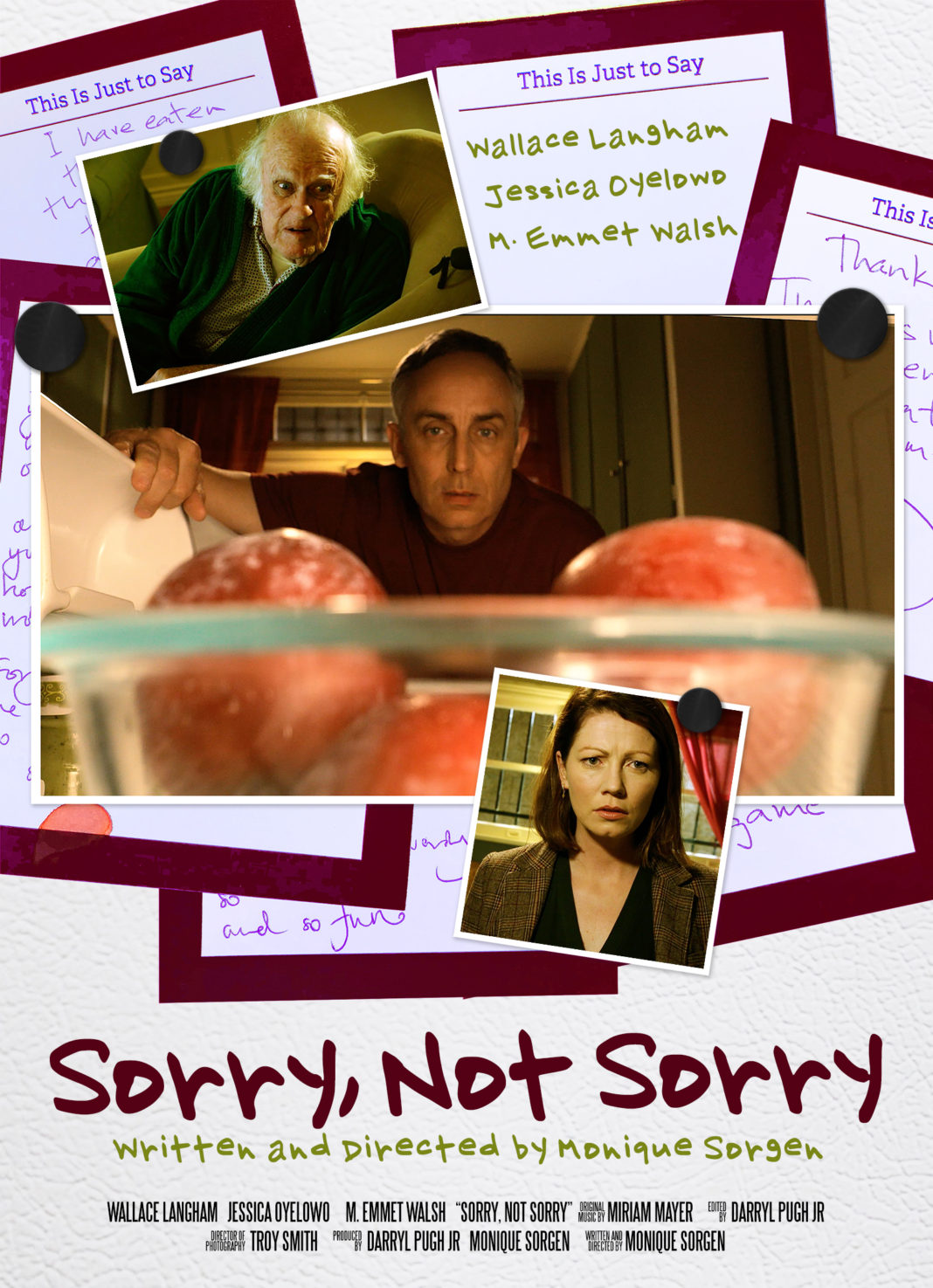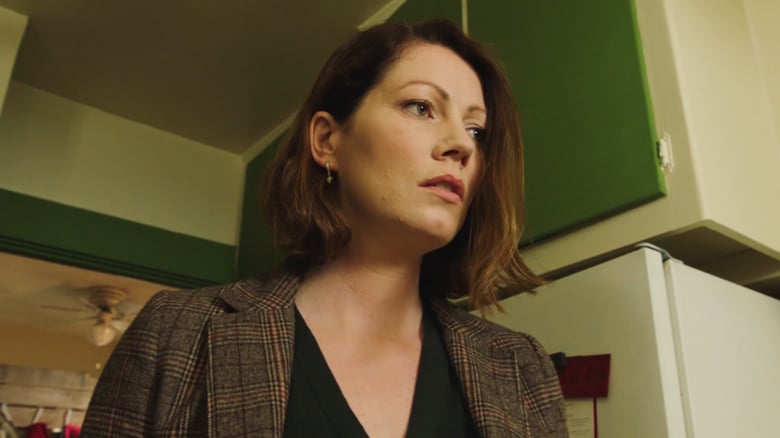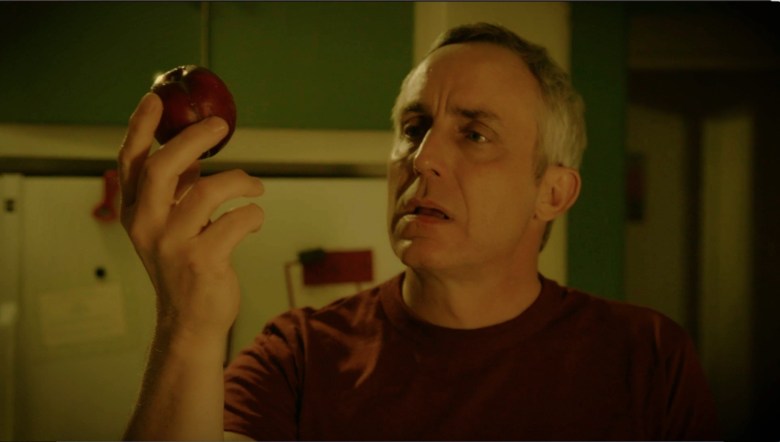Another short screening at the Oscar-qualifying Cleveland International Film Festival is Monique Sorgen’s darkly comic Sorry, Not Sorry, about a marriage seemingly in crisis.
The trailer can be viewed here:
Film and TV Now had the pleasure of interviewing Sorgen about the film and it’s evolution:
FILM AND TV NOW: The film subverts the concept of a marriage in crisis with a deliciously dark and comic pay-off. Was this the initial intention when the script was written?
MONIQUE SORGEN: When I wrote the script, it was primarily inspired by the poem, “This is Just to Say,” by William Carlos Williams, and the feelings the poem has always given me— which are a combination of anger at the guy for eating the plums after specifically being told not to, but also respect for him, for feeling so unapologetic about having done something that he really felt he needed to do for himself. So the script is really just my interpretation of the subtext of the poem. That said, my personal perspective on marriage shines through loud and clear, as I’ve never been much of a fan of the institution. I’ve always believed marriage was something of a trap, because humans need to be free to grow and change in any direction they see fit in their pursuit of happiness, and I see marriage as something that can really suppress that freedom for a lot of people. Ideally, when you get married, you hope to grow and change in the same ways as your spouse, but that doesn’t always happen. Then, when people realize that they’re trapped in a marriage, and they’re not being allowed to be who they want to be anymore, they start acting out. They start taking each other for granted and stop communicating. The couple in the movie starts out in that place. But on a more positive note, I believe that when the movie is over, and their main problem is “resolved,” they are going to realize they were on the same page all along, because they are perfect for each other, and they will fall back in love again. Because despite my cynicism, I’m actually a romantic.
FTVN: Great to see M. Emmet Walsh on screen as the elderly father. How did you manage to get him as one of your key cast members?
MS: M. Emmet Walsh is just fantastic! He’s a true actor’s actor, who just loves acting and wants to be doing it every day of his life. I had already cast Wallace Langham, who’s a pretty big TV star in his own right— having starred in CSI, The Larry Sanders Show, and Veronica’s Closet (among many other films and TV shows)— so that legitimized the project before Emmet got involved. Emmet was available on the day I was shooting, so his manager suggested him to me, and I said yes, please! For him, I think this was just another chance to do the thing he loves doing, and when I sent him the script, he liked the character and the story enough to want to take it on. I was also happy to be able to give Wally a chance to work with an actor he respects so much, because I didn’t want Wally to feel like he was carrying the movie all alone.
FTVN: The film also focuses on the essence of communication or miscommunication as the couple air their frustrations with a series of irritating acts on each other. Did you do much research into the context of marriage or did it come out of personal experience?
MS: The series of events definitely did not come out of any personal experience. That came from thinking about what the worst thing would be that you could do to a person, and then what the next worse thing would be that could top that. What is personal to me in the story is the underlying emotion that you feel when you’re not being heard. What the characters are feeling matters more to me than what they do. They’re both feeling so lonely and isolated in their own house and in their marriage. And they’re both acting out passive-aggressively over it, leaving notes for each other that basically say (in subtext), “I would apologize, but you deserve this, because you’re not paying attention to me.” The irony is that the father is the only one who’s saying out loud that he wants attention, and he ends up taking so much of their energy that they really don’t have anything left for each other at the end of the day.
FTVN: Objects rather than people are the focus of the frustrations of the couple, be it plums or a car as two examples in the film. How long was the original script and how many drafts did you write?
MS: The film was always around 7 pages. I’m a big believer in getting feedback, and based on that I probably wrote about 3 drafts— most of which involved suggestions that would enhance what I already had on the page or make the funny bits funnier. The incidents in the escalations never changed, because I had outlined those before I ever wrote the script. That was the first thing I did. And it was the reason I added the father to the story. The father isn’t part of the poem at all, but I needed him to make this story work. The biggest re-write actually happened in the editing room, after the film was shot. I had written way too much dialogue for the father, because his character was inspired by my deceased grandmother, who used to have so many funny expressions, and I wanted to fit them all into the piece as an homage to her memory. But in post production we had to whittle it down to just the essential things he says, so despite how much he talks in the film, he used to talk twice as much!
FTVN: In addition to M. Emmet Walsh, you secured the services of two other profile actors in Wallace Langham and Jessica Oyelowo. How did you convince these two to star in your short?
MS: Wally was an old friend of my Cinematographer, Troy Smith. They had been running in the same circle of friends for 20 years. Because Troy had already been nice enough to agree to shoot my movie, I didn’t want to also ask him to ask Wally for me, so I asked another guy in their group of friends, who happened to be developing a television show with Wally at the time, and was able to get him the script the same day. Two days later Wally reached out to me and said he liked the script and would be interested in doing the role and working with his old friend Troy again. (Troy had recently shot a short film that Wally directed.) Jess didn’t come along until later, when I already had Wally and Emmet on board. I’d met her before, because she had a kid in my niece’s class at school. My sister (who is my niece’s mom) had her contact information, but for some reason, none of it was working and the school was on Spring Break, so we couldn’t find her there either. I’d gotten it in my head that I wanted her because I thought her English accent and her “innocent” look would contradict the harsh actions the character takes in the story, and make them seem more surprising. After Spring Break ended, we finally found her at school. She asked to read the script and see the look book, and I sent over some other samples of my work, and she agree to come on board. Her performance exceeded all my highest expectations, and now we’re working together on a feature film I want to direct with her starring.
FTVN: Where did you shoot and for how long?
MS: We shot in a house in Hollywood for one “split” day— meaning we started in the afternoon and shot into the night so we could capture both the daytime and the night scenes all in one shoot day. In order to get 7 pages and all the cutaways done we had to block-shoot the whole thing— which means that we shot shot several scenes at once, in little pieces, based on whatever direction the camera and lights were facing. For example, if a character is looking at the refrigerator, we’d shoot the piece from Jess’s scene and then the piece from Wally’s scenes. Then we’d turn toward the door and shoot the pieces of Jess’s scenes, and then the pieces from Wally’s scenes in that direction. It’s challenging because you’re totally out of order, and you have to make sure you don’t forget to shoot any pieces of the scene. For the actors, the challenge is keeping track of where they are in the emotional arc of the scene, but they’re all such consummate professionals, that they didn’t have a problem.
Finding the location in LA was actually one of the bigger challenges I faced because in Los Angeles, people are used to film shoots, so it’s not that exciting for them, and they always want more money than you can afford on a short film budget. Also, I needed a house with a lot of entrances and exits and a good view from the kitchen to the living room where the father is watching TV. I was hoping for a house with a colorful kitchen, but this one was white, so I asked the woman who lived there if I could paint the kitchen cabinets and moulding green, and she thought it would be a nice change, so we painted it!
FTVN: Finally, what are your hopes for the film in terms of it’s festival success and your own career development as a director and film-maker?
MS: I hope the film gets to play at a whole bunch of festivals, so it can get to the widest audience of cinefiles possible. I’d love to win some awards, not only for my own work, but also for the actors, and the cinematographer, and the composer— who I think all did a top notch job. I made this film as a sample of my directing work to use for both film and television jobs. I started out my career on network television sets as a director’s assistant, so I always thought I’d be a television director. But I’ve also written several feature films that I’d like to direct— one of which I’m developing with Jessica Oyelowo, through her company Yoruba Saxon. It’s a dark comedy called “Bad BFF,” and she would play a woman who pretends she’s getting married in order to get her life-long best friend to pay attention to her. Not un-coincidentally, this is also a story that subverts marriage, but from the point of view of an unmarried woman who values friendships with her girlfriends above all else, and thinks marriage is stealing all her friendships away. At it’s core, it’s meant to show how deeply women bond with one another— which is contrary to the popular (and I think false) depiction of women as catty, competitive, and backstabbing. That has not been my experience with other women, and I want to set the record straight. My goal is to be shooting this movie in the fall.































